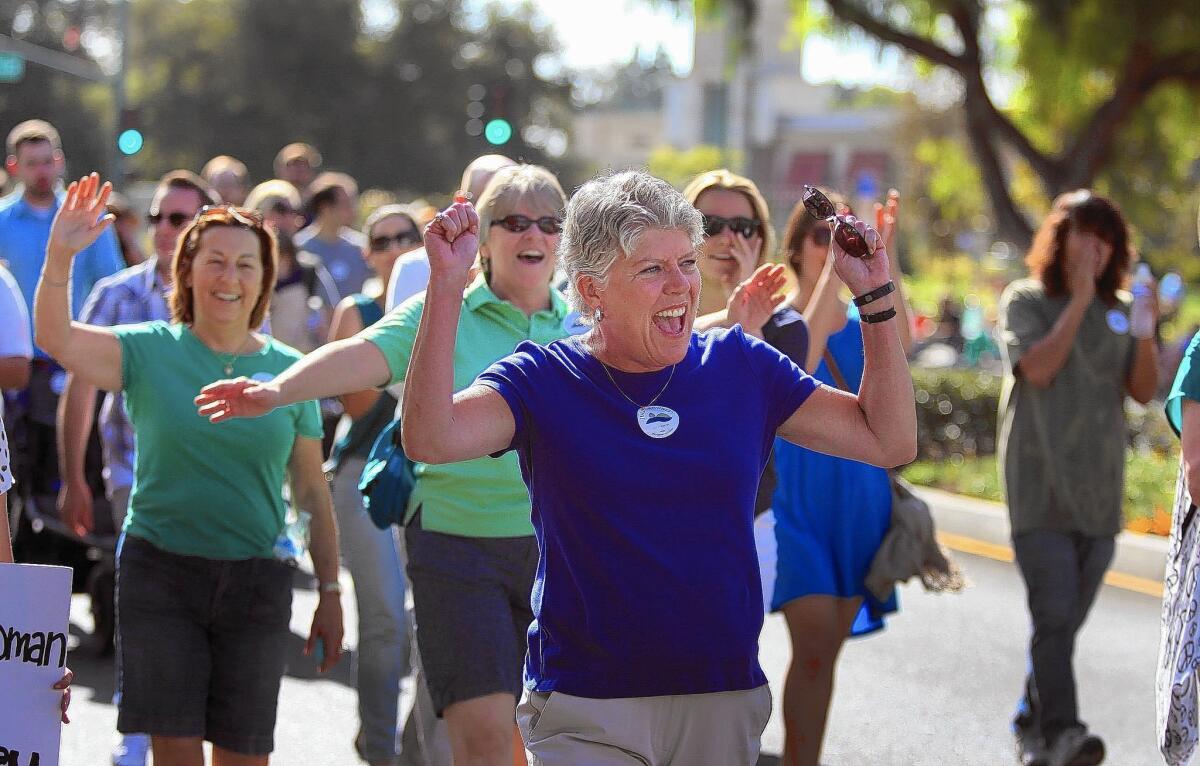Democratic candidates working hard to get women to the polls

- Share via
When Rep. Julia Brownley aired the first television ad of her fall reelection campaign, she aimed the 30-second spot directly at women.
“I believe we are strongest when women are in charge of their own decisions,” the Westlake Village Democrat says in the ad, which is airing on local cable stations.
“That’s why,” Brownley continues, gazing straight into the camera, “I will always fight for equal pay for equal work and defend your right to choose.”
As Democratic leaders struggle to keep control of the U.S. Senate and minimize losses of House seats this fall, Brownley’s pitch is key. She and other Democratic candidates are focusing on women, who have strongly favored the party in recent elections and helped President Obama keep his job two years ago.
But many of those women stay home when the presidency is not at stake. So Democrats are making a special effort to draw them to the polls this fall.
“Women voters and women’s issues are key for House races … no question about it,” said Kelly Ward, executive director of the Democratic Congressional Campaign Committee. “We know Democratic voters drop off in midterm elections more than Republican voters do, and women are a big part of that.”
It’s especially true of single women, according to research by the nonpartisan Voter Participation Center and the consulting firm Lake Research Partners. About 22 million fewer unmarried women voted in 2010, a nonpresidential year, than in 2008, when Obama first ran. For married women, the drop was 10 million.
In California, despite Democrats’ 43%-28% registration edge, the lack of competitive races at the top of the ticket this year has party leaders worried that their voters will take a pass on the Nov. 4 election.
That could enable Republicans, with their consistently better turnout rates, to make some gains, even taking back at least a couple of the four California congressional seats they lost in 2012, some analysts say.
Enter ROSIE, the Democratic Congressional Campaign Committee’s new voter outreach project formally titled Re-engaging Our Sisters in Elections. Intentionally evocative of Rosie the Riveter of World War II, it’s a computer model that identifies unmarried female voters so the party can reach out to them.
Campaign messages can be tailored to those women and the issues they have been shown to care most about, including pay equity, child care, domestic violence, and access to healthcare, abortion and other reproductive rights.
The campaign of Rep. Ami Bera (D-Elk Grove) has used ROSIE data for phone banks. Female volunteers call targeted voters to talk about the differences between their candidate and his Republican challenger, former Rep. Doug Ose of Sacramento, on issues of particular interest to women.
Others emphasize women’s economic matters in their campaign mail and highlight House Republicans’ records on such signature Democratic issues as equal pay for equal work.
Some of the pitches come in TV ads like Brownley’s; others show up in fundraising appeals or on the campaign trail.
Democrat Amanda Renteria, challenging Rep. David Valadao (R-Hanford), chose Women’s Equality Day last month to announce her endorsement from the U.S. Women’s Chamber of Commerce.
Bera, who is locked in a fierce fight to hold the seat he won in 2012 by defeating a Republican incumbent, recently addressed the annual gathering of the National Partnership for Women and Families. A physician, Bera said he has worked “to keep politics out of the exam room.”
The Inland Empire battle to succeed retiring Rep. Gary Miller (R-Rancho Cucamonga) is arguably the Democrats’ best hope for wresting a seat from Republicans. Redlands’ Democratic mayor, Pete Aguilar, joined female small-business owners and members of his “Women for Pete” coalition to mark Women’s Equality Day.
Aguilar supporters also have publicized his Republican opponent’s opposition to abortion and his endorsement from the National Right to Life, an anti-abortion group.
A campaign spokesman for the opponent, military veteran Paul Chabot, who finished first in the primary in the Democrat-leaning district, cited its “large conservative Catholic Latino population” as one of several factors he believes will give Chabot the edge on election day.
The two other strongly challenged freshman congressmen, Reps. Scott Peters (D-San Diego) and Raul Ruiz (D-Palm Desert), also have made special appeals to women.
Joined by scores of women, Peters held a news conference at which he accused Republican candidate Carl DeMaio of having an “anti-women agenda.”
Among other things, he cited DeMaio’s support for a proposal that would make prescription contraceptives available over the counter, saying such a plan would “make birth control less affordable” (health insurance coverage typically does not extend to over-the-counter drugs).
DeMaio said nonprescription birth control would save women the trouble of a doctor’s appointment.
In Palm Desert, Democratic activists demonstrated in front of the campaign headquarters of Ruiz’s Republican challenger, Assemblyman Brian Nestande. They were protesting Nestande’s vote against a state bill, now signed into law, requiring most health plans to cover birth control measures.
Nestande explained his rationale to the Desert Sun newspaper, saying “Obamacare has inserted the government into private medical decisions.”
Ken Goldstein, a professor of politics at the University of San Francisco, said it makes sense for Democrats to focus on women this year, especially in close races, but increasing turnout won’t be easy.
“Democrats are getting very good,” Goldstein said, at finding which voters to talk to and sending the right messages. “But there is only so much you can do to get people who don’t feel like voting to vote.”
jean.merl@latimes.com
Twitter: @jeanmerl
More to Read
Sign up for Essential California
The most important California stories and recommendations in your inbox every morning.
You may occasionally receive promotional content from the Los Angeles Times.











